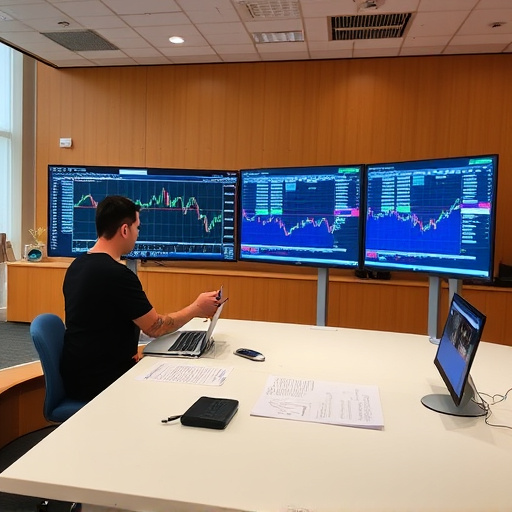Short-term trading strategies, accessible through online trading courses, empower individuals to excel in financial markets by identifying and capitalizing on small price movements in assets like stocks, commodities, or currencies. These dynamic, flexible learning options cater to working professionals and those seeking improved financial literacy, democratizing access to trading education. A comprehensive trading course covers fundamental concepts, live market data, charting tools, simulation platforms, and community elements for continuous learning, ultimately fostering a better-informed investor community. Choosing the right trading course involves researching reputable platforms, matching skill levels, and selecting curricula aligned with personal learning goals and interests.
In today’s dynamic financial landscape, short-term trading has gained immense popularity among investors seeking agile, lucrative opportunities. The cityscape has transformed into a hub of online trading courses, making high-quality educational resources accessible citywide. This article explores the rise of these modules, delving into their key components and offering guidance on choosing the right trading course tailored to individual needs. Unlock your trading potential with the right online learning path.
- Understanding Short-Term Trading Strategies
- The Rise of Online Trading Courses Citywide
- Key Components of a Comprehensive Short-Term Trading Module
- Accessing and Choosing the Right Trading Course for Your Needs
Understanding Short-Term Trading Strategies

Short-term trading strategies are a crucial aspect of navigating the financial markets, and understanding them is essential for any trader looking to enhance their skills. These strategies involve making rapid trades, often within a single day or over a few days, with the goal of capitalizing on small price movements in assets like stocks, commodities, or currencies. A well-structured trading course can equip individuals with the knowledge to recognize profitable opportunities and execute trades efficiently.
By learning these methods, traders can master techniques such as scalping, swing trading, and momentum strategies. Scalping, for instance, focuses on capturing tiny price changes over short periods, while swing trading identifies trends and profit from short-term fluctuations in an asset’s price. A comprehensive trading course should cover risk management, market analysis tools, and the psychology required to thrive in this dynamic environment.
The Rise of Online Trading Courses Citywide

In recent years, the landscape of financial education has undergone a significant transformation with the rise of online trading courses available citywide. This shift is largely driven by the growing demand for accessible and flexible learning options, especially among working professionals and individuals seeking to enhance their financial literacy. With the convenience of attending classes from home or on-the-go, these modules cater to a diverse range of students, offering them the opportunity to master trading strategies without the traditional constraints of time and location.
The availability of short-term trading courses across cities has democratized access to education in the financial markets. Today, aspiring traders can choose from a variety of online platforms, each boasting its unique curriculum, expert instructors, and interactive learning environments. This newfound accessibility is particularly beneficial for those who want to dip their toes into the world of trading without committing to lengthy and intensive programs. As a result, more folks are now equipped with the knowledge and skills needed to navigate the markets, potentially leading to increased participation and a more informed investor community.
Key Components of a Comprehensive Short-Term Trading Module

A comprehensive short-term trading module should include several key components that cater to both novice and experienced traders looking to enhance their skills in a bustling market. Firstly, an engaging and interactive trading course is essential. This should cover fundamental concepts such as market analysis, risk management strategies, and technical indicators, presented in a structured curriculum that builds from basic to advanced topics.
Additionally, access to live market data feeds, charting tools, and simulation platforms is crucial for practical application of learned theories. These resources enable traders to backtest strategies, fine-tune their approaches, and gain confidence before risking real capital. A robust community element, featuring discussions forums or mentorship programs, can also foster continuous learning and provide invaluable insights into navigating the dynamic landscape of short-term trading.
Accessing and Choosing the Right Trading Course for Your Needs

Accessing a quality trading course is the first step in your short-term trading journey. With numerous options available online and traditionally, it’s essential to choose a course that aligns with your learning style and goals. Start by researching different platforms and institutions offering trading courses. Look for reputable sources with positive reviews and successful graduate testimonials. Many courses cater to various skill levels, from beginners to advanced traders, so select one tailored to your current knowledge base.
Consider the format of the course as well—live webinars, pre-recorded modules, or a blend of both. Online platforms often provide flexibility in terms of scheduling, making it convenient for working professionals. Compare course curricula and focus areas, such as technical analysis, fundamental trading strategies, risk management, or algorithmic trading. Choose a course that offers comprehensive coverage and practical exercises to enhance your understanding.
In today’s digital era, the rise of online trading courses has made short-term trading strategies accessible citywide. By understanding key components like technical analysis, risk management, and market trends, aspiring traders can choose the right modules to suit their needs. A comprehensive short-term trading module should offer interactive learning, practical exercises, and ongoing support, empowering individuals to navigate the markets confidently. Accessing these courses allows folks to embark on a journey towards financial independence, revolutionizing their relationship with investing.
